The blockchain in logistics market is estimated to be valued at USD 4.1 billion in 2025 and is projected to reach USD 37.2 billion by 2035, registering a compound annual growth rate (CAGR) of 24.6% over the forecast period.
In the logistics market, blockchain technology holds an estimated 5-7% of the market share, driven by its increasing adoption to streamline supply chain operations and enhance data accuracy. Blockchain helps improve transparency, reduce errors, and optimize communication among logistics providers, leading to more efficient operations. Within the supply chain management market, blockchain contributes around 8-10%, as its ability to provide end-to-end visibility and secure, real-time tracking of goods makes it a powerful tool for reducing delays and preventing fraud. It helps manage inventory more effectively and ensures that all parties in the supply chain have access to accurate and tamper-proof information.
In the technology and IT market, blockchain’s share in logistics is approximately 3-5%, as part of the broader digital transformation trend within industries. Its role in automating processes and facilitating secure transactions has gained significant traction across different sectors, not just logistics. In the e-commerce market, blockchain accounts for about 4-6%, where it supports secure, transparent transactions and enhances trust among consumers and businesses.
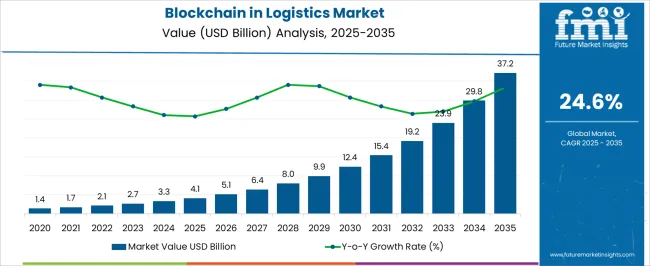
Blockchain’s ability to track goods from purchase to delivery makes it a valuable tool in e-commerce platforms that require efficient logistics operations. In the financial technology (FinTech) market, blockchain represents roughly 5-7%, facilitating faster, more secure payments and reducing the complexities of cross-border transactions in logistics. These shares highlight the growing integration of blockchain technology across various sectors, driven by the need for more secure, transparent, and efficient systems.
Supply chain traceability represents a substantial market segment where blockchain technology creates immutable records of product origins, manufacturing processes, and transportation history that support regulatory compliance, quality assurance, and brand protection initiatives. Food safety applications utilize blockchain to track agricultural products from farm to consumer, enabling rapid response to contamination incidents and supporting organic certification verification. Pharmaceutical supply chains implement blockchain solutions to combat counterfeit drugs, ensure cold chain compliance, and meet serialization requirements across international distribution networks. Luxury goods authentication leverages blockchain to verify product authenticity and prevent grey market distribution.
Transportation management systems incorporate blockchain technology to create transparent freight marketplaces, automate carrier payments, and verify service level performance across multi-party logistics networks. Trucking companies use blockchain-based platforms to share capacity information, coordinate load assignments, and establish reputation systems that reward reliable service performance. Ocean freight operators implement blockchain solutions to track container movements, automate demurrage calculations, and coordinate vessel scheduling across port networks. Air cargo applications focus on high-value shipments that require enhanced security and chain of custody documentation.
| Metric | Value |
|---|---|
| Blockchain in Logistics Market Estimated Value in (2025 E) | USD 4.1 billion |
| Blockchain in Logistics Market Forecast Value in (2035 F) | USD 37.2 billion |
| Forecast CAGR (2025 to 2035) | 24.6% |
The blockchain in logistics market is gaining strong traction as the industry increasingly prioritizes transparency, security, and efficiency in supply chain operations. The ability of blockchain technology to provide immutable, real-time data sharing across stakeholders is transforming logistics processes, reducing fraud, and streamlining compliance management. Rising global trade complexities, coupled with the need for end-to-end visibility, are accelerating adoption in both domestic and cross-border logistics networks.
Governments and enterprises are recognizing blockchain’s potential to enhance trust and accountability, which is influencing regulatory frameworks and encouraging investments in blockchain infrastructure. Integration with IoT devices and AI-powered analytics is further improving the precision and traceability of goods movement.
The market is also benefiting from cost savings achieved through reduced paperwork, faster customs clearance, and improved asset utilization As digital transformation accelerates in logistics, blockchain platforms are expected to serve as the foundation for secure, scalable, and interoperable supply chain ecosystems, paving the way for long-term growth and innovation across multiple logistics applications.
The blockchain in logistics market is segmented by application, industry vertical, component, deployment, organization size, and geographic regions. By application, blockchain in logistics market is divided into Tracking and tracing, Smart contracts, Payment and settlement, Inventory management, Fleet management, and Freight brokerage. In terms of industry vertical, blockchain in logistics market is classified into Retail & manufacturing, Healthcare, Food and beverage, Automotive, Oil and gas, and Others. Based on component, blockchain in logistics market is segmented into Platform and Services. By deployment, blockchain in logistics market is segmented into Public blockchain, Private blockchain, and Hybrid blockchain. By organization size, blockchain in logistics market is segmented into Large enterprises and Small and Medium-sized Enterprises (SME). Regionally, the blockchain in logistics industry is classified into North America, Latin America, Western Europe, Eastern Europe, Balkan & Baltic Countries, Russia & Belarus, Central Asia, East Asia, South Asia & Pacific, and the Middle East & Africa.
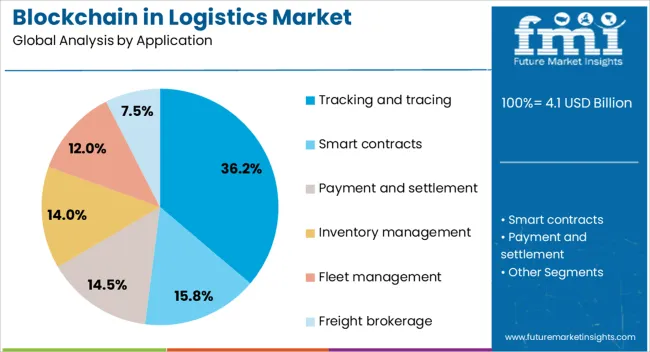
The tracking and tracing segment is projected to hold 36.2% of the blockchain in logistics market revenue share in 2025, positioning it as the leading application area. Its dominance is being driven by the growing requirement for real-time shipment visibility and authenticity verification across global supply chains. Blockchain technology enables the creation of an immutable ledger that records every step of a product’s journey, ensuring that stakeholders can verify its origin, transit path, and handling conditions.
This capability is particularly critical in high-value and sensitive goods transportation, where transparency reduces the risk of counterfeiting and theft. Increasing regulatory focus on product traceability in sectors such as food, pharmaceuticals, and luxury goods is further accelerating adoption.
The integration of blockchain with IoT sensors allows for automatic updates on location, temperature, and other critical parameters, enhancing operational efficiency As supply chains become more complex and demand for transparency intensifies, the tracking and tracing segment is expected to maintain its leadership position, supported by strong enterprise and regulatory momentum.
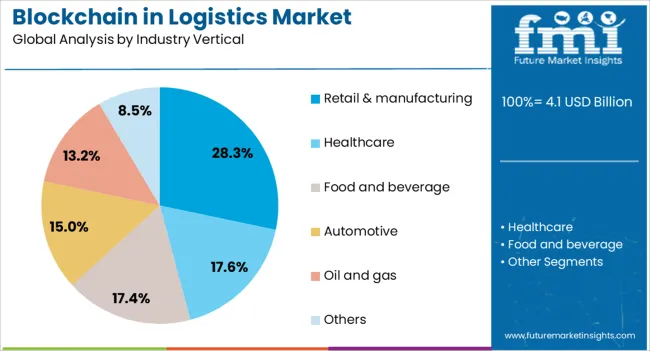
The retail and manufacturing segment is anticipated to account for 28.3% of the blockchain in logistics market revenue share in 2025, making it the leading industry vertical. This leadership is being reinforced by the sector’s high dependency on complex, multi-tiered supply chains that demand precise tracking, inventory control, and supplier authentication. Blockchain’s capability to unify data from diverse sources into a single, verifiable record helps retailers and manufacturers streamline procurement, production, and distribution processes.
The technology also plays a pivotal role in verifying supplier compliance, managing recalls efficiently, and ensuring the authenticity of raw materials and finished goods. Adoption is being supported by the need to reduce operational inefficiencies, mitigate counterfeit risks, and meet rising consumer expectations for ethical sourcing and sustainability.
Furthermore, blockchain’s compatibility with automated payment systems and smart contracts enables faster settlement cycles, improving cash flow across the value chain With digital transformation becoming a competitive necessity in retail and manufacturing, blockchain integration is expected to drive long-term process optimization and market leadership in this segment.
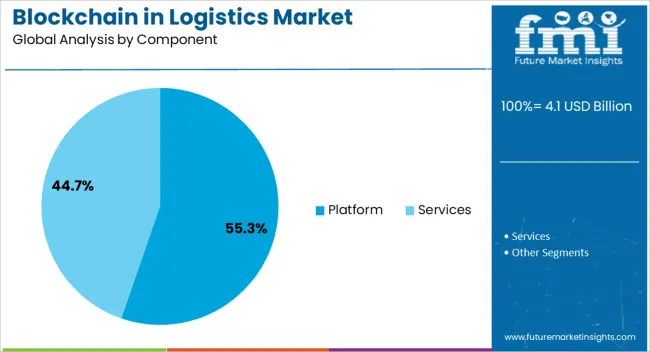
The platform segment is expected to capture 55.3% of the blockchain in logistics market revenue share in 2025, establishing itself as the largest component category. This dominance is being fueled by the critical role platforms play in providing the core infrastructure for blockchain-enabled logistics solutions. Platforms enable the secure development, deployment, and integration of decentralized applications that support diverse use cases such as shipment tracking, customs clearance, and contract management.
The scalability, interoperability, and security offered by these platforms make them essential for enterprises seeking to implement blockchain across complex logistics networks. Growing investment in blockchain-as-a-service offerings by technology providers is expanding accessibility for small and medium-sized enterprises, further broadening adoption.
Additionally, the flexibility to integrate with IoT systems, ERP software, and AI-driven analytics enhances the functionality of blockchain platforms, making them central to next-generation logistics operations As logistics companies increasingly seek end-to-end digital transformation, the platform segment’s ability to deliver robust, adaptable, and secure solutions is expected to sustain its market leadership.
The blockchain in logistics market is rapidly expanding due to the increasing need for enhanced transparency, security, and efficiency in supply chain management. Blockchain's ability to provide immutable records and real-time tracking is transforming logistics operations, especially in sectors like automotive, pharmaceuticals, and food. The integration of blockchain with emerging technologies such as IoT and AI is enabling predictive analytics and streamlined operations. The market is expected to grow substantially, driven by both technological advancements and the growing demand for secure, efficient logistics solutions across global supply chains.
The growth of the blockchain in logistics market is fueled by several key drivers. Blockchain technology provides enhanced transparency and traceability, allowing stakeholders to track goods in real-time and reduce fraud. Additionally, the use of smart contracts automates processes, improving operational efficiency by reducing paperwork and manual interventions. The integration of blockchain with AI and IoT technologies enables predictive analytics, improving decision-making in logistics. Blockchain ensures compliance with international regulations, especially in sectors like pharmaceuticals and food, where traceability and verification are critical, thereby driving widespread adoption in these industries.
The blockchain in logistics market presents numerous opportunities for innovation and market expansion. Blockchain-as-a-Service (BaaS) platforms offered by companies like IBM and Microsoft are providing scalable blockchain solutions for logistics companies, enabling easier adoption. Blockchain can also streamline cross-border trade by reducing customs delays and improving efficiency in international shipping. The technology’s ability to track sustainability in logistics operations presents an opportunity for companies to enhance their environmental efforts and gain credibility in green initiatives. Furthermore, the growing trend of digitalization in logistics offers significant potential for blockchain integration, driving further market growth.
Several trends are shaping the future of the blockchain in logistics market. The shift toward private and consortium blockchains is gaining momentum, as businesses prefer permissioned systems for enhanced security and control. The integration of AI and blockchain is facilitating predictive analytics, enhancing logistics operations by offering real-time decision-making insights. Additionally, collaborative platforms within the logistics industry are emerging, where consortia develop shared blockchain networks to standardize and streamline operations across supply chains. These trends highlight a dynamic market with continuous technological advancements driving the future of blockchain in logistics.
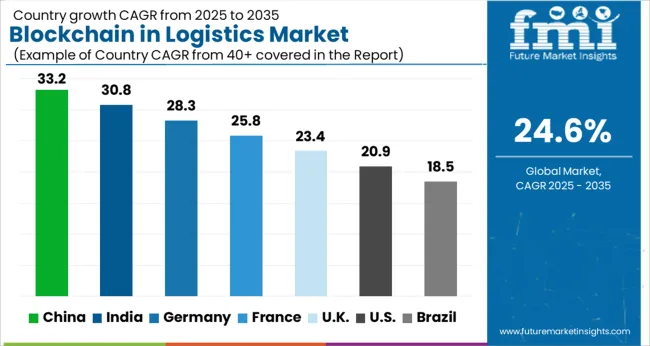
| Country | CAGR |
|---|---|
| China | 33.2% |
| India | 30.8% |
| Germany | 28.3% |
| France | 25.8% |
| UK | 23.4% |
| USA | 20.9% |
| Brazil | 18.5% |
The global blockchain in logistics market is projected to grow at a CAGR of 24.6% from 2025 to 2035. Among the key markets, China leads with a growth rate of 33.2%, followed by India at 30.8%, and France at 25.8%. The United Kingdom and the United States show more moderate growth rates of 23.4% and 20.9%, respectively. This growth is driven by the increasing demand for digital solutions in logistics, particularly for transparency, security, and efficiency. Emerging markets like China and India are expanding rapidly, while developed markets focus on digital transformation and process optimization. The analysis includes over 40+ countries, with the leading markets detailed below.
China is projected to lead the global blockchain in logistics market, growing at a rapid CAGR of 33.2% from 2025 to 2035. The country’s significant investment in technological infrastructure, along with its focus on digitizing logistics operations, is driving the market’s growth. China’s strong manufacturing and supply chain sectors, combined with the rise in e-commerce and cross-border trade, are pushing the need for blockchain technology to enhance transparency, security, and efficiency in logistics. The adoption of blockchain is expected to increase, enabling better traceability, reducing fraud, and optimizing logistics management across industries like retail, automotive, and manufacturing.
The blockchain in logistics market in India is expected to grow at a CAGR of 30.8% from 2025 to 2035. The country’s expanding logistics sector, driven by increasing e-commerce activity, the rise in international trade, and the need for enhanced supply chain efficiency, is fueling demand for blockchain solutions. Blockchain technology offers India’s logistics companies the opportunity to optimize operations, ensure transparency, reduce delays, and prevent fraud. The government’s initiatives to modernize logistics infrastructure, such as the implementation of the National Logistics Policy, are expected to further accelerate blockchain adoption.
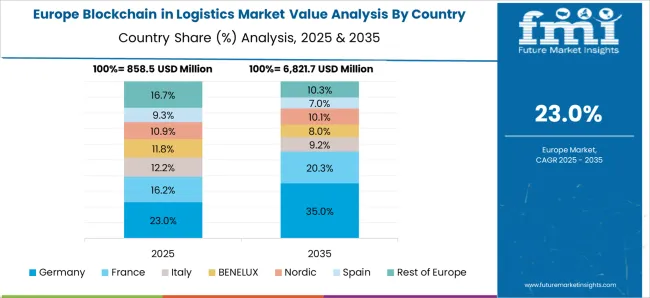
The blockchain in logistics market in France is anticipated to expand at a CAGR of 25.8% from 2025 to 2035. France’s strong logistics and transportation sectors, combined with increasing demand for transparency and efficiency, are driving the adoption of blockchain technology. The country’s focus on digitizing its supply chain operations, particularly in sectors like retail, automotive, and pharmaceuticals, is expected to enhance blockchain implementation. Furthermore, the European Union’s focus on improving digital trade and supply chain resilience is also expected to support market growth, positioning France as a leading adopter of blockchain solutions in logistics.
The United Kingdom’s blockchain in logistics market is expected to grow at a CAGR of 23.4% from 2025 to 2035. The UK’s increasing focus on digitizing logistics operations, particularly in transportation and warehousing, is a key driver of market growth. Blockchain technology is being increasingly used to streamline processes, reduce inefficiencies, and enhance transparency in the country’s complex logistics sector. The rise of e-commerce, the demand for secure transactions, and the UK’s growing need to ensure supply chain resilience and traceability are expected to contribute significantly to the growth of the blockchain in logistics market.
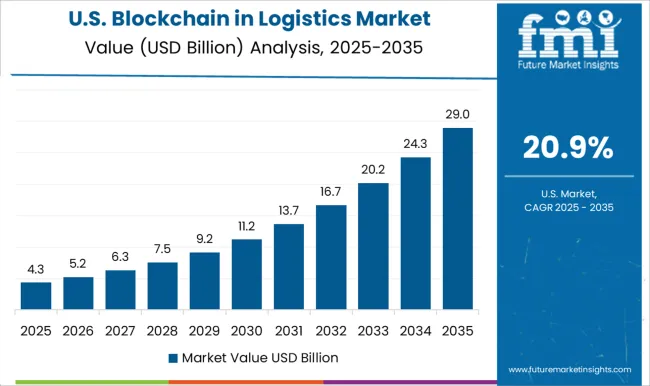
The United States blockchain in logistics market is projected to grow at a CAGR of 20.9% from 2025 to 2035. The USA has a well-established logistics sector, and the increasing need for operational efficiency, transparency, and reduced costs is driving the demand for blockchain solutions. The adoption of blockchain technology in industries like retail, automotive, and logistics is expected to reduce fraud, improve transparency, and streamline supply chain management. With the rise in e-commerce, cross-border trade, and supply chain complexities, the USA is poised to benefit significantly from blockchain’s ability to improve logistics operations.
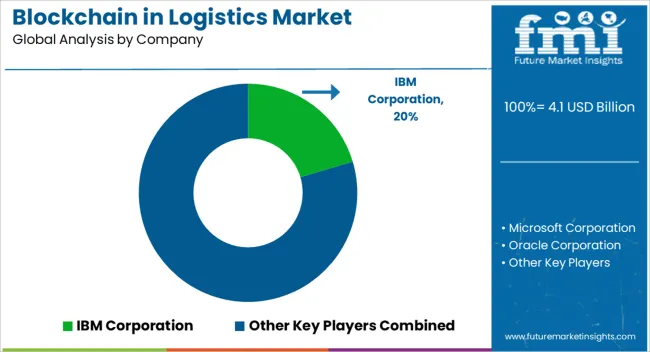
The blockchain in logistics market is expanding rapidly as global technology providers and logistics leaders deploy decentralized systems to enhance transparency, security, and operational efficiency across supply chains. IBM Corporation remains a pioneer with its IBM Food Trust and TradeLens platforms, offering end-to-end traceability and data sharing across global logistics networks. Microsoft Corporation supports enterprises through its Azure Blockchain Service, enabling scalable, customizable blockchain networks that integrate easily with existing logistics systems.
Oracle Corporation leverages its Blockchain Cloud Service to deliver secure shipment tracking, contract management, and improved data authenticity for logistics providers. SAP SE integrates blockchain within its SAP Logistics Business Network, ensuring greater supply chain visibility, provenance tracking, and automation across industries such as manufacturing, retail, and pharmaceuticals. Amazon Web Services (AWS) accelerates blockchain adoption through its Managed Blockchain Service, providing businesses with tools to deploy and manage blockchain applications efficiently.
Intel Corporation contributes to the ecosystem by developing hardware and cryptographic solutions that enhance blockchain security and transaction performance. Maersk Line, as a logistics leader, implements blockchain for container tracking and document digitization, significantly reducing paperwork and delays.
| Item | Value |
|---|---|
| Quantitative Units | USD 4.1 Billion |
| Application | Tracking and tracing, Smart contracts, Payment and settlement, Inventory management, Fleet management, and Freight brokerage |
| Industry Vertical | Retail & manufacturing, Healthcare, Food and beverage, Automotive, Oil and gas, and Others |
| Component | Platform and Services |
| Deployment | Public blockchain, Private blockchain, and Hybrid blockchain |
| Organization Size | Large enterprises and Small and Medium-sized Enterprises (SME) |
| Regions Covered | North America, Europe, Asia-Pacific, Latin America, Middle East & Africa |
| Country Covered | United States, Canada, Germany, France, United Kingdom, China, Japan, India, Brazil, South Africa |
| Key Companies Profiled | IBM Corporation, Microsoft Corporation, Oracle Corporation, SAP SE, Amazon Web Services (AWS), Intel Corporation, and Maersk Line. |
| Additional Attributes | Dollar sales by platform (cloud-based, on-premise), blockchain type (public, private, consortium), and end-use applications (transportation management, inventory management, freight management, shipment tracking). Demand is driven by the increasing need for real-time tracking, enhanced data security, and the optimization of global supply chains. Regional trends show a strong adoption rate in North America, Europe, and Asia-Pacific due to high digital transformation initiatives and government support for blockchain projects. |
The global blockchain in logistics market is estimated to be valued at USD 4.1 billion in 2025.
The market size for the blockchain in logistics market is projected to reach USD 37.2 billion by 2035.
The blockchain in logistics market is expected to grow at a 24.6% CAGR between 2025 and 2035.
The key product types in blockchain in logistics market are tracking and tracing, smart contracts, payment and settlement, inventory management, fleet management and freight brokerage.
In terms of industry vertical, retail & manufacturing segment to command 28.3% share in the blockchain in logistics market in 2025.






Our Research Products

The "Full Research Suite" delivers actionable market intel, deep dives on markets or technologies, so clients act faster, cut risk, and unlock growth.

The Leaderboard benchmarks and ranks top vendors, classifying them as Established Leaders, Leading Challengers, or Disruptors & Challengers.

Locates where complements amplify value and substitutes erode it, forecasting net impact by horizon

We deliver granular, decision-grade intel: market sizing, 5-year forecasts, pricing, adoption, usage, revenue, and operational KPIs—plus competitor tracking, regulation, and value chains—across 60 countries broadly.

Spot the shifts before they hit your P&L. We track inflection points, adoption curves, pricing moves, and ecosystem plays to show where demand is heading, why it is changing, and what to do next across high-growth markets and disruptive tech

Real-time reads of user behavior. We track shifting priorities, perceptions of today’s and next-gen services, and provider experience, then pace how fast tech moves from trial to adoption, blending buyer, consumer, and channel inputs with social signals (#WhySwitch, #UX).

Partner with our analyst team to build a custom report designed around your business priorities. From analysing market trends to assessing competitors or crafting bespoke datasets, we tailor insights to your needs.
Supplier Intelligence
Discovery & Profiling
Capacity & Footprint
Performance & Risk
Compliance & Governance
Commercial Readiness
Who Supplies Whom
Scorecards & Shortlists
Playbooks & Docs
Category Intelligence
Definition & Scope
Demand & Use Cases
Cost Drivers
Market Structure
Supply Chain Map
Trade & Policy
Operating Norms
Deliverables
Buyer Intelligence
Account Basics
Spend & Scope
Procurement Model
Vendor Requirements
Terms & Policies
Entry Strategy
Pain Points & Triggers
Outputs
Pricing Analysis
Benchmarks
Trends
Should-Cost
Indexation
Landed Cost
Commercial Terms
Deliverables
Brand Analysis
Positioning & Value Prop
Share & Presence
Customer Evidence
Go-to-Market
Digital & Reputation
Compliance & Trust
KPIs & Gaps
Outputs
Full Research Suite comprises of:
Market outlook & trends analysis
Interviews & case studies
Strategic recommendations
Vendor profiles & capabilities analysis
5-year forecasts
8 regions and 60+ country-level data splits
Market segment data splits
12 months of continuous data updates
DELIVERED AS:
PDF EXCEL ONLINE
Logistics Packaging Market Size and Share Forecast Outlook 2025 to 2035
Blockchain Interoperability Market Size and Share Forecast Outlook 2025 to 2035
Blockchain Food Traceability Market Size and Share Forecast Outlook 2025 to 2035
Blockchain AI Market Size and Share Forecast Outlook 2025 to 2035
Logistics Robots Market Size and Share Forecast Outlook 2025 to 2035
Blockchain Messaging Apps Market Size and Share Forecast Outlook 2025 to 2035
Logistics Visibility Software Market Size and Share Forecast Outlook 2025 to 2035
Blockchain Market Size and Share Forecast Outlook 2025 to 2035
Blockchain in Energy Market Size and Share Forecast Outlook 2025 to 2035
Blockchain Identity Management Market Size and Share Forecast Outlook 2025 to 2035
Blockchain in Agriculture and Food Supply Chain Market Size and Share Forecast Outlook 2025 to 2035
Blockchain Technology Market Analysis & Forecast 2025 to 2035, By Solution, Use Case, Enterprise Size, Industry, and Region
Key Players & Market Share in the Logistics Packaging Industry
Logistics Outsourcing Market Analysis - Growth & Forecast 2025 to 2035
Blockchain in Banking Market
Logistics Visualization System Market
Blockchain in Agriculture Market Analysis – Size, Share & Forecast 2024-2034
Logistics Automation Market
Cash Logistics Market Size and Share Forecast Outlook 2025 to 2035
Rail Logistics Market Size and Share Forecast Outlook 2025 to 2035

Thank you!
You will receive an email from our Business Development Manager. Please be sure to check your SPAM/JUNK folder too.
Chat With
MaRIA